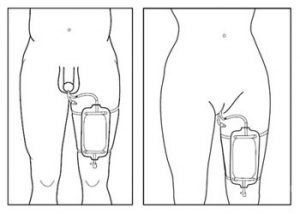A nurse at an outpatient clinic receives a call from a client who reports experiencing syncope after starting a new prescription for enalapril.
Which of the following instructions should the nurse give the client?
Decrease daily fluid intake.
Withhold the medication if pulse rate is less than 60/min
Rise slowly from a sitting position to a standing position
Increase dietary potassium
The Correct Answer is C
Orthostatic hypotension, which is a sudden drop in blood pressure upon standing, can be a side effect of enalapril and may lead to syncope. Instructing the client to rise slowly from a sitting to a standing position helps minimize the risk of a sudden drop in blood pressure and decreases the chances of syncope occurring.
Decreasing fluid intake is not likely to be the cause of syncope related to enalapril. It is important for clients to maintain adequate hydration, especially if they are experiencing side effects such as orthostatic hypotension.
While a low pulse rate may indicate bradycardia, it is not the primary concern in this situation. Orthostatic hypotension leading to syncope is the main issue, and the client should be instructed to rise slowly to prevent it.
While enalapril is an angiotensin-converting enzyme (ACE) inhibitor that can increase potassium levels in the blood, it is not directly related to syncope. Dietary changes should be made under the guidance of a healthcare provider based on individual needs and blood test results.

Nursing Test Bank
Naxlex Comprehensive Predictor Exams
Related Questions
Correct Answer is ["C"]
Explanation
A: The tubing should not be coiled on the bed, especially not above the collection bag, as this can interfere with the drainage of urine and increase the risk of infection.
B: The drainage bag should always be kept below the level of the bladder during ambulation to prevent backflow and reduce the risk of infection.
C: Securing the catheter tubing to the lower abdomen (for male clients) or thigh (for female clients) helps to reduce the risk of catheter displacement and trauma. Proper securing also prevents unnecessary tension on the tubing, which can cause urethral irritation.
D:A sterile specimen should be collected from the sampling port of the catheter tubing, not directly from the drainage bag, which could lead to contamination.

Correct Answer is ["C"]
Explanation
A.While it's important to document visitors and support persons, this information may not be considered crucial for the change-of-shift report unless it directly impacts the client's care or well-being.
B. The client received the prescribed antibiotic every 8 hours: This is important information, but it is typically documented in the medication administration record (MAR) and does not need to be included in the verbal report unless there were issues or changes related to the medication.
C. The client reports pain is reduced when positioned on his side: This is significant information as it informs the incoming nurse about the client's preferred position for pain management. It helps guide the nurse in providing comfort measures and appropriate positioning for the client. The client's mother died 4 years ago from breast cancer: This information may not be considered vital for the change-of-shift report unless it directly impacts the client's current condition or ongoing care.
D. The client's mother died 4 years ago from breast cancer: This information may not be considered vital for the change-of-shift report unless it directly impacts the client's current condition or ongoing care.
Whether you are a student looking to ace your exams or a practicing nurse seeking to enhance your expertise , our nursing education contents will empower you with the confidence and competence to make a difference in the lives of patients and become a respected leader in the healthcare field.
Visit Naxlex, invest in your future and unlock endless possibilities with our unparalleled nursing education contents today
Report Wrong Answer on the Current Question
Do you disagree with the answer? If yes, what is your expected answer? Explain.
Kindly be descriptive with the issue you are facing.
